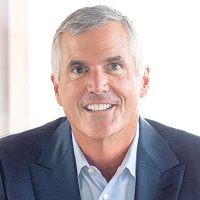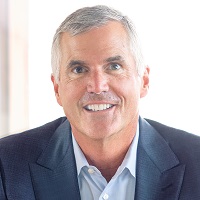Volatility Doesn’t Have to Spell Retirement Planning Trouble
Inflation, rising rates and market gyrations can actually make this a good time to clarify your vision for the future and ensure your portfolio matches those goals and protects against risk.


Profit and prosper with the best of Kiplinger's advice on investing, taxes, retirement, personal finance and much more. Delivered daily. Enter your email in the box and click Sign Me Up.
You are now subscribed
Your newsletter sign-up was successful
Want to add more newsletters?

Delivered daily
Kiplinger Today
Profit and prosper with the best of Kiplinger's advice on investing, taxes, retirement, personal finance and much more delivered daily. Smart money moves start here.

Sent five days a week
Kiplinger A Step Ahead
Get practical help to make better financial decisions in your everyday life, from spending to savings on top deals.

Delivered daily
Kiplinger Closing Bell
Get today's biggest financial and investing headlines delivered to your inbox every day the U.S. stock market is open.

Sent twice a week
Kiplinger Adviser Intel
Financial pros across the country share best practices and fresh tactics to preserve and grow your wealth.

Delivered weekly
Kiplinger Tax Tips
Trim your federal and state tax bills with practical tax-planning and tax-cutting strategies.

Sent twice a week
Kiplinger Retirement Tips
Your twice-a-week guide to planning and enjoying a financially secure and richly rewarding retirement

Sent bimonthly.
Kiplinger Adviser Angle
Insights for advisers, wealth managers and other financial professionals.

Sent twice a week
Kiplinger Investing Weekly
Your twice-a-week roundup of promising stocks, funds, companies and industries you should consider, ones you should avoid, and why.

Sent weekly for six weeks
Kiplinger Invest for Retirement
Your step-by-step six-part series on how to invest for retirement, from devising a successful strategy to exactly which investments to choose.
The past year has given investors plenty of reasons to worry about their retirement savings. While fear is an understandable response to the perfect storm of inflation, rising interest rates, bank failures and market volatility, current economic conditions also provide an opportunity for people to step back and ensure they are well-positioned for the future.
Retirement planning is more complex than most people realize, which is why long-term preparation is critical. Yet many people I talk to spend weeks planning vacations but don’t spend more than an hour or two each month thinking about retirement — if they think about it at all.
When the economic environment is constantly shifting, it’s easy for investors to make reactive decisions based on daily ups and downs. However, these short-term decisions can have long-lasting effects that work against a person’s overall financial goals.
From just $107.88 $24.99 for Kiplinger Personal Finance
Become a smarter, better informed investor. Subscribe from just $107.88 $24.99, plus get up to 4 Special Issues

Sign up for Kiplinger’s Free Newsletters
Profit and prosper with the best of expert advice on investing, taxes, retirement, personal finance and more - straight to your e-mail.
Profit and prosper with the best of expert advice - straight to your e-mail.
F&G’s third annual Risk Tolerance Tracker, which surveyed nearly 1,700 American investors, found that 73% are worried about their retirement income compared to the past two years — 61% in 2021 and 60% in 2020. Of the top concerns, 79% of respondents are worried about inflation impacting their retirement, a sentiment that has continued to increase since 2021, when 73% of respondents said the same.
So, what are investors doing? Nearly half (48%) say they are taking action and actively adjusting their retirement plans. This is good news. A solid, well-thought-out plan makes it easier to put emotion aside. But before making any changes, people should first reassess what retirement means to them.
What Does Retirement Look Like for Me?
One of the first questions financial advisers tend to be asked is, “How much do I need to save for retirement?” It’s a question that is impossible to answer without a deep dive into a person’s lifestyle and vision for the future. For example, does the person need to support adult children or elderly parents? How long do people in their family tend to live? Do they have health issues? Is it important for them to leave money for the next generation, or do they plan to spend most or all of what they have?
All of these things will have a large impact on a person’s “retirement number.”
Does My Portfolio Match My Goals?
Once a person has a vision of what retirement will look like, they should evaluate their portfolio — ideally with a financial adviser — to ensure they have the right products to help them get there. Some may be leaving themselves exposed by taking on too much risk, while others may not be taking enough risk to generate the returns they need.
Often, people say one thing about their risk tolerance and do another. Our survey found that 78% of American investors say they have become more financially risk averse — up from 69% in 2021. Despite this, many investors are relying on volatile investment vehicles such as stocks (41%), with some branching into riskier assets like cryptocurrency (20%).
As people get closer to retirement, their risk tolerance understandably declines. At that stage of life, the risk of a big loss isn’t worth a few extra percentage points of return. Where life insurance can provide peace of mind by ensuring that one’s family is taken care of, eliminating the need for a retiree to worry about if they are spending too much of their children’s inheritance, insurance products like annuities can reduce the level of risk within a retirement portfolio.
Many annuities are protected from market downturns, serve as a hedge against inflation and can come with a duration that matches one’s life expectancy, reducing longevity risk. Annuities can provide a different sort of guarantee — a stream of guaranteed income. As with life insurance, annuities can remove anxiety over spending, as people know they will be getting a check every month for as long as they live.
Despite the benefits these types of products can provide, only 14% of Americans report owning one, underscoring how many investors are not taking advantage of the full range of options available to address these types of inflation or longevity concerns.
How Do I Create a Holistic Plan?
Of course, creating a personalized portfolio is easier said than done. As investors look at products to purchase, they must analyze the pros and cons of each one, as well as how they work together in a diversified plan.
As mentioned, insured products can help create a more holistic plan alongside traditional investments, and speaking with a financial adviser can help simplify the process. While 45% of American investors say they are willing to explore new financial products, a majority (58%) are not leveraging the skills of an adviser to create a strong portfolio.
By clarifying their vision for the future, exploring an expanded universe of financial products and connecting with an adviser, investors can ensure their portfolios are built to optimize opportunities and protect their downside risk. While the current financial environment can be scary, stepping back from the day-to-day to plan for the long term can help people stay focused on the big picture and sleep better at night.
Profit and prosper with the best of Kiplinger's advice on investing, taxes, retirement, personal finance and much more. Delivered daily. Enter your email in the box and click Sign Me Up.

For more than 30 years, Chris Blunt has held senior leadership positions at several major insurance and financial services companies. He joined F&G in 2019 and currently serves as the Chief Executive Officer. Prior to that, he served as Chief Executive Officer at Blackstone Insurance Solutions and spent nearly 13 years at New York Life in a variety of executive roles.
-
 Dow Adds 1,206 Points to Top 50,000: Stock Market Today
Dow Adds 1,206 Points to Top 50,000: Stock Market TodayThe S&P 500 and Nasdaq also had strong finishes to a volatile week, with beaten-down tech stocks outperforming.
-
 Ask the Tax Editor: Federal Income Tax Deductions
Ask the Tax Editor: Federal Income Tax DeductionsAsk the Editor In this week's Ask the Editor Q&A, Joy Taylor answers questions on federal income tax deductions
-
 States With No-Fault Car Insurance Laws (and How No-Fault Car Insurance Works)
States With No-Fault Car Insurance Laws (and How No-Fault Car Insurance Works)A breakdown of the confusing rules around no-fault car insurance in every state where it exists.
-
 For the 2% Club, the Guardrails Approach and the 4% Rule Do Not Work: Here's What Works Instead
For the 2% Club, the Guardrails Approach and the 4% Rule Do Not Work: Here's What Works InsteadFor retirees with a pension, traditional withdrawal rules could be too restrictive. You need a tailored income plan that is much more flexible and realistic.
-
 Retiring Next Year? Now Is the Time to Start Designing What Your Retirement Will Look Like
Retiring Next Year? Now Is the Time to Start Designing What Your Retirement Will Look LikeThis is when you should be shifting your focus from growing your portfolio to designing an income and tax strategy that aligns your resources with your purpose.
-
 I'm a Financial Planner: This Layered Approach for Your Retirement Money Can Help Lower Your Stress
I'm a Financial Planner: This Layered Approach for Your Retirement Money Can Help Lower Your StressTo be confident about retirement, consider building a safety net by dividing assets into distinct layers and establishing a regular review process. Here's how.
-
 The 4 Estate Planning Documents Every High-Net-Worth Family Needs (Not Just a Will)
The 4 Estate Planning Documents Every High-Net-Worth Family Needs (Not Just a Will)The key to successful estate planning for HNW families isn't just drafting these four documents, but ensuring they're current and immediately accessible.
-
 Love and Legacy: What Couples Rarely Talk About (But Should)
Love and Legacy: What Couples Rarely Talk About (But Should)Couples who talk openly about finances, including estate planning, are more likely to head into retirement joyfully. How can you get the conversation going?
-
 How to Get the Fair Value for Your Shares When You Are in the Minority Vote on a Sale of Substantially All Corporate Assets
How to Get the Fair Value for Your Shares When You Are in the Minority Vote on a Sale of Substantially All Corporate AssetsWhen a sale of substantially all corporate assets is approved by majority vote, shareholders on the losing side of the vote should understand their rights.
-
 How to Add a Pet Trust to Your Estate Plan: Don't Leave Your Best Friend to Chance
How to Add a Pet Trust to Your Estate Plan: Don't Leave Your Best Friend to ChanceAdding a pet trust to your estate plan can ensure your pets are properly looked after when you're no longer able to care for them. This is how to go about it.
-
 Want to Avoid Leaving Chaos in Your Wake? Don't Leave Behind an Outdated Estate Plan
Want to Avoid Leaving Chaos in Your Wake? Don't Leave Behind an Outdated Estate PlanAn outdated or incomplete estate plan could cause confusion for those handling your affairs at a difficult time. This guide highlights what to update and when.